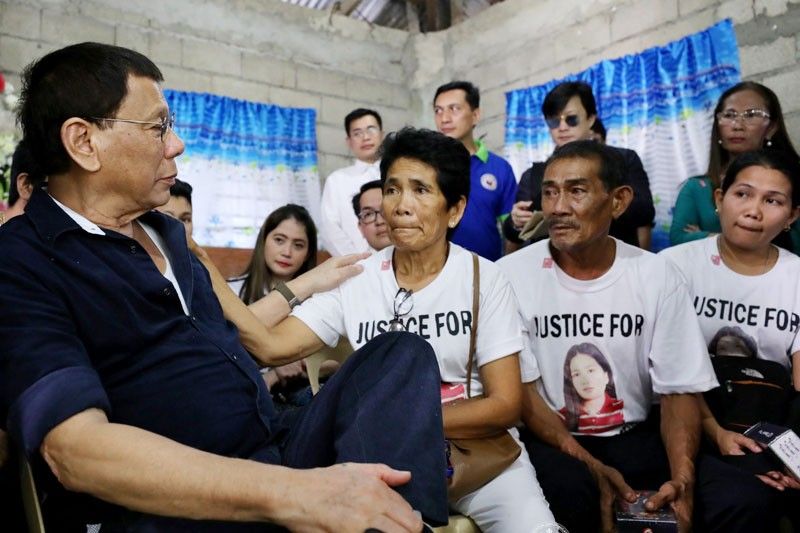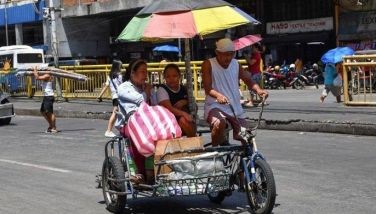Duterte won’t lift ban on OFW deployment to Kuwait

MANILA, Philippines — The ban on the deployment of workers to Kuwait will continue and could be expanded to other countries where Filipino workers “suffer brutal treatment and human degradation,” President Duterte reiterated yesterday.
The President made the remarks after attending the wake of Joanna Demafelis in Iloilo province, adding he intends to file criminal charges against her employers, a Lebanese man and a Syrian woman, who are being hunted by Kuwaiti authorities.
Demafelis’ body was found stuffed in a freezer in a Kuwait City apartment where it had reportedly been for more than a year. Initial findings revealed her body bore torture marks and there were indications she was strangled.
Despite the current problems, Kuwait has expressed optimism that the “rocky” period it is going through in its relationship with the Philippines will be ironed out soon, saying it is ready to cooperate to resolve Manila’s concerns over reported abuse of Filipino migrant workers in the Gulf state.
“We want to take it to another stage of cooperation. Nothing to affect us, every problem between our two countries will be solved,” Kuwaiti Ambassador Mousaed Al-Thwaikh said on Wednesday night on the sidelines of Kuwait’s 57th Independence Day celebration.
President Duterte ordered the ban on the deployment of workers to Kuwait following the deaths of Demafelis and seven other Filipinos abused by their employers.
Two senators yesterday expressed support for the ban, including its extension to other countries as mentioned by Duterte due to inhumane treatment and abuses.
But international group Human Rights Watch does not see the ban as a deterrent to abuses against overseas Filipino workers. It warned that the move is even likely to increase abuses of workers who are forced to resort to unsafe and unregulated channels to enter the country.
Kuwait reiterated its invitation for the President to visit Kuwait.
However, Foreign Affairs Secretary Alan Peter Cayetano said last Friday that the President would not visit Kuwait without direction towards solving the problems of Filipinos there.
Duterte ordered Cayetano to secure a commitment from the Kuwaiti government that it would protect Filipinos working in the Gulf state.
Al-Thwaikh said he would not know what the Philippine government’s decision would be but “we are in (a) good relationship.”
The Philippines welcomed on Wednesday Kuwait’s decision granting Manila’s request to extend its amnesty program, saying this would allow several thousands more undocumented Filipinos to return home.
The ambassador said the extension of the amnesty program was a reflection of good relations between the Philippines and Kuwait.
“It’s because of our good relations. That reflects our good relations,” Al-Thwaikh said.
“That’s our job, (to do) humane things,” he said, adding Kuwait and its leaders have been known for being humanitarian.
Cayetano said it was indeed a “very positive gesture” on the part of Kuwait that would contribute to ongoing efforts to address matters of mutual concern to the two countries.
“And for us to continue moving forward, we expect our Kuwaiti friends to make substantial commitments on pragmatic and impermeable steps aimed at better protecting the rights and promoting the welfare of our kababayans in Kuwait,” Cayetano said.
Kuwait announced that it had decided to extend the three-week amnesty period that was supposed to end yesterday by another two months or until April 22.
Philippine Ambassador to Kuwait Renato Villa said the extension order was signed by Kuwait Interior Minister Sheikh Khalid Al-Jarrah Al-Sabah and was issued on Tuesday.
The decision came less than a week after Cayetano formally conveyed the Philippines’ request for extension during a meeting with the Kuwaiti ambassador in Manila.
Cayetano said he asked for the extension to allow the embassy to accommodate and process more of the 10,800 undocumented Filipinos in Kuwait who may want to come home as only close to 3,000 of those qualified have applied so far.
He said he and the Department of Foreign Affairs remain in close coordination with the Department of Labor and Employment (DOLE) to ensure a successful outcome of negotiations with the Kuwaiti government on the improvement of protection mechanisms for the more than 250,000 Filipinos working there.
The DFA said amnesty extension buoyed the hopes of hundreds of frantic Filipino workers who think they would not be accommodated in the last remaining repatriation flights to Manila.
The undocumented workers, who trooped to the embassy on Tuesday afternoon, were assured by Villa there was no reason to be worried as the amnesty extension would now allow them to be included in the repatriation.
Villa said the embassy has processed 3,801 travel documents for workers since the amnesty period began and has so far repatriated 1,796. He said more than 2,000 more workers would be repatriated in the next days.
On Tuesday, the DFA flew home some 580 workers via Cebu Pacific and Philippines Airlines.
Support for the ban
Sens. Cynthia Villar and Sherwin Gatchalian said a ban on deployment not only in Kuwait but in other countries where abuses have been committed against Filipino household service workers (HSWs) would be acceptable.
Villar said a large number of HSWs were beaten up, tortured and even killed.
Gatchalian, for his part, called for a review of all the countries where overseas Filipino workers (OFWs) are being deployed to find out if these have sufficient laws or policies for the protection of migrant workers.
Speaking at a forum at the Senate yesterday, Gatchalian said it was time for the concerned government agencies to conduct a review of all countries with OFW presence, especially after the reported abuses experienced by Filipino HSWs in Kuwait at the hands of their employers.
For Gatchalian, the minimum requirement for receiving countries is that they should have legislation to protect migrant workers, which he said is something that is non-negotiable.
Ideally, he said that there should be a bilateral agreement between the host country and the Philippines on the protection of migrant workers to ensure that OFWs are protected from abuses.
In conducting the review, Gatchalian said the government should look out for a number of red flags, including the absence of any law protecting migrant workers and the recorded abuses committed against OFWs.
“Now if there is none (law protecting migrant workers) then we should no longer deploy to those countries,” Gatchalian said.
He said the host countries should be fully compliant in the protection of migrant workers and that cases such as Kuwait, which was deemed partially compliant by the DFA, should not be allowed to take in Filipino workers.
Holistic solutions
HRW said Kuwait and the Philippines should instead agree on key reforms that could more effectively protect migrant domestic workers in the Gulf state.
Rothna Begum, Middle East women’s rights researcher, said
“Kuwait should confront the outcry over deaths, beatings and rapes of domestic workers by taking immediate steps to reform the kafala system, which traps workers with abusive employers.”
Kuwait’s kafala or sponsorship system ties migrant domestic workers’ visas to their employers, prohibiting workers from leaving or changing jobs without their employers’ consent.
Previous bans by the Philippines and similar bans by other countries of origin did little to end abuses in Kuwait or other Middle Eastern countries, HRW said.
Instead, people desperate to work still migrate, but through unsafe and unregulated channels. These can leave them exposed to abuse and trafficking and make it more difficult to address abuses.
The Philippines and Kuwait have yet to sign a pending bilateral labor agreement to protect Filipino domestic workers, HRW said.
“While bilateral agreements have many limitations, they can be helpful when there is an agreed upon mutually enforceable employment contract that provides real protections and effective complaint systems and investigation procedures,” Begum said.
“The Philippines should also seek agreement to continue criminal or civil cases against employers or agencies on behalf of workers who wish to return home and who provide a power of attorney to embassy officials,” Begum said, among other measures to protect Filipino workers. – Pia Lee-Brago, Marvin Sy, Rhodina Villanueva, AP
- Latest
- Trending





























